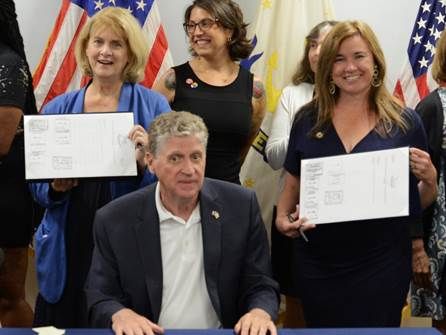New law helps encourage diversity in social worker licensing

Rep. Mary Ann Shallcross Smith, left, and Sen. Alana M. DiMario, right, hold their bills after Gov. Daniel McKee, seated, signed them Friday. At center is Michelle Paliotta, a faculty member in the BSW program at Rhode Island College and a clinician.
STATE HOUSE – Legislation sponsored by Sen. Alana M. DiMario and Rep. Mary Ann Shallcross Smith has been signed into law to help increase access to social workers and better enable the field to attract licensees who can meet the language and cultural needs of Rhode Island.
The new law (2022-S 2617A, 2022-H 7396A), which Gov. Daniel McKee ceremonially signed Friday, changes the licensing requirements for social workers to encourage more licensees whose first language is not English.
Rhode Island’s social worker licensing has two tiers: licensed clinical social workers, and licensed independent clinical social workers. Licensees at both levels must meet multiple qualifications, including completion of a master’s or doctorate social work degree at a qualifying higher education institution. The bill establishes that, for the next three years, only licensees at the higher level — licensed independent clinical social workers — be subject to the requirement of a standardized test, and encourages the Board of Social Work Examiners to consider offering that test in languages other than English as well as other accommodations for those who are not native English speakers or other alternatives that might not include the standardized test.
“Rhode Island needs more social workers, and we especially need those who are multilingual and who have awareness of the cultural needs of our diverse population. Licensing requirements should actually reflect the skills that we need our social workers to have, and should not serve to prevent qualified, well-trained individuals from getting licensed,” said Representative Shallcross Smith (D-Dist. 46, Lincoln, Pawtucket).
Said Senator DiMario (D-Dist. 36, Narragansett, North Kingstown), “Standardized tests are not necessarily the best tool for determining the qualification of a candidate. There haven’t been any studies linking success on the test with success in the field, and we already have other stringent training and qualification requirements in place, such as completion of a master’s or a doctorate social work program. Additionally, passage of this test depends on a person’s understanding of very nuanced language that a non-native speaker may struggle with, even if they are fluent in English. Considering how much we need multilingual social workers, at minimum we should be offering the licensing test in other languages.”
